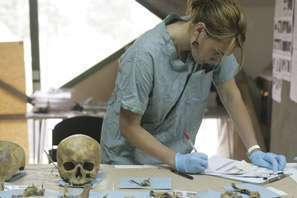
remains, then you can look at becoming a forensic anthropologist. Image source: Britannica.com
If you are interested in becoming a forensic anthropologist, here is a guide that shows you what the profession entails and how to start a career in it, including getting certification.
Who is a forensic anthropologist?
A forensic anthropologist works with law enforcement agents in examining the remains of the human skeleton for the purpose of determining from unidentified bones its identity. See details of the duties they perform below.
Educational Requirements and Training
The first step towards becoming a forensic anthropologist can be to earn a Bachelor’s degree in anthropology, and to be conversant with areas of study like archaeology, cultural and physical anthropology, as well as sciences subjects like genetics, chemistry, and anatomy.
Basically, to pursue a career in forensic anthropology, you must have a master’s degree in anthropology also, and likely aim for a Ph.D. in biological or physical anthropology.
This means in actual sense that you may be spending upwards of ten years in school to qualify to become a forensic anthropologist, not forgetting to include internships, clinical experience and field work as part of formal training processes.
While undergoing graduate classes, the forensic anthropologist in training may likely be exposed to areas like human anatomy, gross dissection, probability, statistics, and even quantitative analysis.
Although, at the doctoral level, it is permitted that expertise be established in areas such as pathology, human osteology, skeleton variation, and biomechanics.
Experiences you may come across will be relating to humans identification methods, analysis and inventory of human skeletal material, collection of evidence, analysis of crime scenes, and archaeological methods.
Some schools also offer certificate programs in forensic anthropology, for example, the University of Hawaii – West O’ahu (UH-WO) in partnership with Leeward Community College offers Certificate in Forensic Anthropology program.
The program is designed to give strong understanding of forensic anthropology using scientific techniques to students.
The course requirements include successfully passing Biology courses in the Leeward Community College, and anthropology courses at the University of Hawaii.
Forensic Anthropologist Certifications
The American Board of Forensic Anthropology (ABFA) recognizes the anthropologist with the title of Diplomate, in addition to meeting the required training and successfully completing written and practical exams.
Other forms of recognition can be obtained by subscribing to the membership of the Physical Anthropology section of the American Academy of Forensic Sciences, as well as the American Association of Physical Anthropologists.
Institutions for Training as Forensic Anthropologist
The University of Tennessee Knoxville, University of Hawaii – West O’ahu, and a number of other institutions offer training programs in forensic anthropology.
It is advised that you contact your local educational services provider for a list of local institutions in your area that offer forensic anthropology.
Duties and Responsibilities of Forensic Anthropologists
It is important to note that unlike what the media portrays forensic anthropologists to be, they basically deal on human remains alone.
Forensic anthropologists assist law enforcement agents to establish a profile on the remains of humans; bones and teeth.
Essentially, by experience, and the application of learned skills, they are able to help answer such questions relating to sex, age, culture, height, period of death, and to even evaluate the level of distress reproduced in bones.
After the identity has been made, the forensic anthropologist may be called to testify in court about the identity of the remains or trauma or wounds observed in the bones.
Generally, a forensic anthropologist does the following to assist law enforcement agents in a case:
- Make an appearance in the scene of a crime to assist in gathering the remains of human parts
- Prepare any skeletal remains for examination
- Look for shock on bones, one that can establish a pathway towards understanding what happened
- Match records with the required experts to ascertain identity
- May appear as a witness in court about the injuries established in the remains
- See detail forensic anthropologist duties here.
Forensic Anthropologist Skills
For a successful career in forensic anthropology, the following skills are needed:
- Analytical skills: Analyzing and complex problem solving are core aspects of the forensic anthropologist’s job. His/her responsibility is simply to be able to provide as much information about the human remains as possible, and he must be able to catch any information his subjects are able to provide
- Accuracy: Since forensic anthropologists will be held responsible for their findings, it becomes important to be as accurate in carrying out investigations as possible
- Organizational skills: Records keeping plays an important role in the daily routine of a forensic anthropologist; good record keeping skills is vital to be able to make effective use of time and space
- Good communication skills: Since he/she will have to interact and communicate his/her findings, the ability to communicate information without ambiguity is a major skill to have to succeed as a forensic anthropologist.
Forensic Anthropologist Career Opportunities
Forensic anthropologists are employed primarily in Universities and Forensic facilities. While most are involved in teaching and research, others are more involved with casework, working closely with medical examiners or pathologists.
Forensic Anthropologist Salary Expectations
The Bureau for Labor Statistics estimates a 19 percent growth between 2012 and 2022, and salaries can be between $34,000 and $92, 000, all depending on location and experience.












